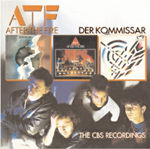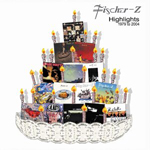Some recent reissues

But where were we? Oh, yes, punk. With their progrock songs documented, and punk happening all around them in London, After the Fire re-emerged from a three week break as a trio instead of a quartet and with a whole bunch of new short songs. Gone were the ten minute epics, here - according to journalist John Gill, an early champion of the band - was ‘power-art-rock’, served up in three minute slices.
Although the interesting drums, bass and keyboards line-up soon became a quartet again, with the addition of a new guitarist, the new attitude and songs stayed, and the band very quickly signed to CBS records, who released three LPs between 1979 and 1982. Edsel Records’ new double CD, Der Kommisar: The CBS Recordings, collects Laser Love, 80f and Batteries Not Included along with some studio and live B-sides.
Although the band skirmished with the charts on several occasions, sold out venues like The Rainbow in London, and undertook massive tours supporting the likes of Queen, ELO and Van Halen [!] they never really achieved commercial success until the release of their cover version of ‘Der Kommisar’, which charted after the band had split. Despite some further work by the lead singer using the band name, laying down new tracks and reworking some band tunes, again nothing happened - and that was it.
In retrospect, it’s interesting to note how contemporary this bright pop sounds. It has links to its progrock roots, but has learnt to edit and curtail the solos; it also has sideways links to bands such as Magazine and XTC in it’s stuttery, upbeat pop that took on the energy of punk along with the musical experimentation and exploration of bands like Can and Faust on the continent.
At the time, of course, it didn’t seem to fit the charts or the indiepop scene, perhaps seemed too mainstream for those looking for hipness and obscurity. But away from the fashion police, with the 21st Century’s plurality of sound, it’s difficult to see why. There are electro-pop instrumentals like ‘Timestar’, the thrash pogo-fest ‘Joy’, nervous new wave songs such as ‘Check It Out’, and the exuberant gutter-pop of ‘Life in the City’ - and that’s just the first album! The title track, ‘Laser Love’, is a perfect pop single, capturing both the new synthesizer sounds available and metaphorically sensing the new technologies breaking through at the time. Zeitgeist! I still have my clear orange vinyl in its die-cut sleeve in my singles box...
1980’s 80f certainly has BIG PRODUCTION stamped all over it, but although that dates it, the uptempo punk-lite of ‘Love Will Always Make You Cry’ and the bizarre synthesizer bass hooks of ‘Who’s Gonna Love You (When You’re Old and Fat and Ugly)?’ win this listener over in the end. Likewise the wistful ‘Starflight’ or the regretful tale of superstar ‘Billy, Billy’, a real prophetic song in the light of our new breed of make-and-break pop culture.
I didn’t hear After the Fire’s final LP until a few years after the event, but if anything it’s their best. The production on Batteries Not Included isn’t quite so in-your-face, and there’s a better mix of ballads, pop and rock. On the ‘In Concert’ they recorded for the BBC, supporting U2, they sounded like a band in control and having fun, a band not scared to let their progrock roots creep in at the edges: some of these songs are a little bit longer, and new influences are to be heard. These are to the fore in the abstract soundscape behind the darkly-spoken text of ‘The Stranger’, or the dubby bass of ‘Dancing in the Shadows’.
The bonus tracks? Well, it’s interesting to hear the two songs which never made the first album but were mainstays of live shows, and good to hear some later live versions - but the latter certainly aren’t vital. It’s good, however, to have all the music gathered together in this way. If you’re really obsessive, you can order the Edsel reissue from the band’s website and you may be in time to receive a bonus disc of unissued demos from the same period, which the band are putting together for fans. But even if you’re not, don’t miss out on this collection of classic keyboard pop.

Again, like After the Fire, Fischer Z had keyboards when that wasn’t hip, knew how to play a bit too well, and didn’t fit in to any of the pigeonholes that planet pop had to offer at the time. Unlike After the Fire, however, time hasn’t made it any easier to file them. They still sound resolutely awkward and nervous. Even declamatory love songs like ‘Marliese’ turn out to be songs about obsession and desire rather than straightforward emotion. And elsewhere the title track of their third LP, Red Skies Over Paradise, is about nuclear war - a politicised view shared by songs such as ‘Berlin’, ‘Cruise Missiles’, ‘Multinationals Bite’ and ‘In England’. But, of course, I digress, as half of these songs aren’t even on the compilation. And neither is the unhappy ‘Wristcutter’s Lullaby’, though it should be.
In fact although I heartily recommend Highlights, it is only a toe in the water that is Fischer Z, and it veers towards the chirpy end of things, which is never really what the band was about. Recent tracks sound like a cleaner version of the old, and perhaps lack the earlier obsessions, although the more recent ‘Destination Paradise’ and ‘Will You Be There’ - which open CD2 - are classics. This is archive pop that has been well overdue for reissue.
Last time I wrote for Tangents I mentioned the curiously named synthesizer band V-Sor, X and said that they’d only released a single vinyl album and a bunch of tapes. How wrong I was! Apparently Genetic Music released a CD in 2001 which gathered up the best tracks from the 80s tape-EPs, and for the last week or so I’ve been nostalgically wallowing in A Strip Of Light But Still Too Dark with its individual take on synthesizer pop. Morgan Bryan steered the band somewhere between Wire and Orchestral Manoeuvres in the Dark, with a hint of early Ultravox: A Strip of Light… is full of catchy hook-laden tracks such as ‘Euromantic’ or [my favourite] ‘Scref’. The CD seems to be out of print, but I found a very cheap copy online at Gemm Music, the big database of secondhand music for sale.
© 2005 Rupert Loydell
Addendum: It appears that the V-Sor, X album is not out of print and is currently available at: http://www.geneticmusic.de/